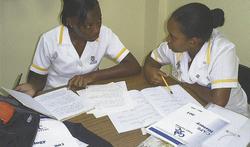
These students of St. Hugh's High School, in St. Andrew recognise that the ability to recall information is largely determined by the way they study. - Contributed
Leethan Grandison, Outlook Youth Writer
The immediate goal of studying is to help you record information and to recall it when necessary. You are probably never more aware of this than when you're confronted with an examination. Outlook Youth believes that your ability to recall information is largely determined by the way you study the material in the first place, as such we embark on an avenue to help you.
Research has shown that learning takes place most effectively when information is processed in small chunks over a particular period. The way to get ahead is to start on effective learning and completing all assignments, including reading before class. Then attend all classes and take thorough notes, this should be followed by reviewing and editing your notes as soon as possible after class.
This process ensures that a considerable amount of learning takes place prior to becoming involved in what most of us term 'study'. If you have prepared yourself in this manner, studying for an examination should be mostly a matter of systematic review. For most courses, this will involve some silent review, where yo read the information you want to learn and then quiz yourself in an attempt to recall the information without the aid of your notes.
Effective learning involves more than simple remembering, it includes developing a concrete understanding and applying the ideas learnt. An easy way to do this is to increase the number of senses involved in the learning process. Recitation is one such way through stimulating of the hearing and visual sense help to enhance recollection. Transforming ideas into diagrams or charts also help.
Writing Information
Many persons have discovered that the motor activity involved in the act of writing out information helps them to remember better. A technique that often accompanies this is the use of cue cards. A cue is usually a word, phrase, or question selected because of its ability to help in recalling of specific information learnt. These can be integrated into your notes by placing them in the right/left-hand margin beside the ideas or information they summarise. You can then study the material by covering your notes and using the cues to help you recall as much as you can. It is recommended that this procedure be repeated until you are able to recall each idea completely.
A good variation of this technique is to write the summary word or phrase on one side of a study card and place the information you want to recall on the other side. Study cards offer two important advantages, first the work involved in making the cards helps you begin to learn and they allow you to physically separate and focus on one piece at a time, which can be important for some of us.
Long List
There are two techniques that can be used for long lists of information. The first is called chunking and refers to breaking the list into related groups of information. First rule of chunking is to make sure that each group contains only those items that have something in common. When you cannot chunk information or you need to recall a list in a specific order, you might want to use a word or sentence, mnemonic. For example PEST under marketing can be used to remember political, economic, socio-cultural and technological factors.
Predicting
A method I normally use when exams are near is to predict test questions. The advantage I find with this is it requires you to consider what you are learning from the examiner's point of view; however, it is worth pointing out that the actual success of your predictions is not necessarily important, as the processing you engage in to develop the questions.
In cases where there are compulsory sections on a paper, it is essential that you prepare thoroughly, especially if you're weak in that area. You can do this by reworking any assignment that you missed, or past papers. While doing this, try to adhere to the time limit that the questions have to emphasise speed as well as accuracy when you practise.
An often-overlooked aid in preparing for exams are the hints provided by your teachers; for external exams it is highly unlikely that they might give accurate predictions but its worth taking their analysis. Teachers are more accurate in predicting papers as they have more knowledge about what the examiners are expecting from you.
Cramming
It's a question that many ask and it is practised by quite a few, should one cram for an exam? Personally, I think you should do so only as a last resort. But cramming gives little time to process ideas in depth, so focus mainly on basic concepts, terminology, or lists that can be memorised and because time is very short, study first those ideas that you strongly expect to be covered on the exam.
Have fun now!
Sources: http://www.studygs.net/
leethan.grandison@yahoo.com

